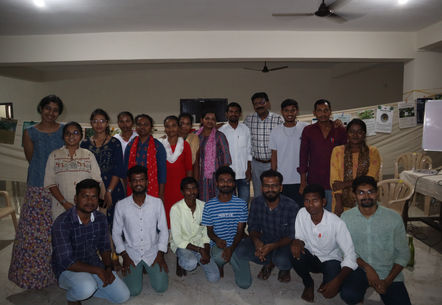
Youth Eco-Feminist Community Action Course
Ice Breaking
The youth course commenced with ice breaking sessions and introductions, followed by laying out the guidelines and mapping the expectations of participants. The sessions consisted of Adivasi dance and songs, and games that built trust and provided an initiation to the vast syllabus lined up for the coming weeks.
International Day of the Indigenous Peoples
The youth celebrated the International Day of Indigenous Peoples on August 9 with a discussion on Adivasi history and their perspective on their identity, rights and marginalisation. It was followed by a visit to the Nehru Centenary Tribal Museum where the participants viewed and discussed the various displays on Adivasi tools, homes, culture and lifestyle. They also visited the historic Charminar as part of their local visits in Hyderabad.
Theatre Workshop
A three-day workshop on the Theatre of the Oppressed was facilitated by theatre practitioner Avijit Solanki. It introduced the participants to appreciate the synergy between the body and mind, the innateness of performance in human society and centrality of the intervention of the audience in a non-sermonizing form of theatre that helps the audience identify social issues which form their lived realities and nudge them to change it, thus acting as a catalyst in revolution. The workshop involved a range of movement-based games, activities that required them to imagine, enact and observe themselves in a situation, and culminated in a short performance directed and staged by the participants with oppression at the heart of the discourse.
Laws and Governance
The participants were introduced to systems of local governance and laws that pertain to administration in scheduled areas. It included group discussions on the functioning of panchayats in scheduled and non-scheduled areas, customary laws regarding marriage, and land inheritance. A session on inheritance of property under the Hindu Succession Act (HSA), Muslim and Christian Personal Laws on inheritance was held to understand the position of scheduled tribes in the crossroads between their customary laws and the HSA.
Caste and Intersectionalities
The Marathi film Sairat (2016) was screened for a discussion on caste and identities, the power of representation and realism grounded in the lives of the marginalized and intersectionalities that inform one’s privilege and upward mobility in society. It led to a discussion on honour and punishment, purity and pollution at the intersection of caste and women’s sexuality. Participants also reflected on how their community and caste panchayats would view and deal with inter-caste marriages.
Independence Day
A precursor to the session on Independence Day was a debate on “Are we all equal?” as participants reflected on what changed from 14th August to 16th August in 1947 and discussed on equality in principle and reality. This was followed by a session on Adivasi leaders that contributed to the freedom struggle who are oft-neglected or their agency is downplayed. The Hindi film Rang De Basanti (2006) was screened to evoke a belief in the possibility to strive for change and revolution.
Sessions with Experts
The youth course collaborated with scholars and experts working on fields relevant to Dalit and Adivasi rights through resource person sessions and exposure visits. Dr. Sudarshan Balaboina, director of the Phule Ambedkar Centre for Philosophical and English Training and professor of political science at Osmania University, conducted a session on Dalit identity, history and functioning of caste through endogamy and gender and caste intersecting to produce relationships of domination and oppression. Dr. Palla Trinadha Rao, a lawyer and scholar who works on Adivasi land and forest rights, conducted a session on scheduled tribes as a Constitutional category, nuances of transfer of land ownership in scheduled areas and discussion on Forest Rights Act (2006) and Panchayat Extension to Scheduled Areas (1996).
Palle Srujana
The participants went on an exposure visit to Palle Srujana, a volunteer-based organisation, that promotes grassroots entrepreneurship and innovations and helps them obtain patents and recognition from governments. Mr. Subash Chander introduced the participants to various agricultural tools and machines that are local innovations and encouraged them to creatively design solutions to problems that are posed in everyday rural lives.
































